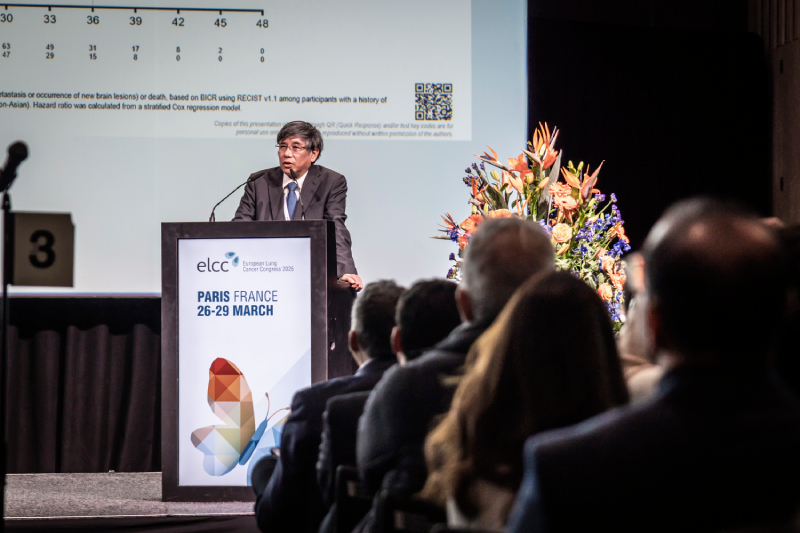EGFR+ Non-Small Cell Lung Cancer Learning Lab

Mara Antonoff, MD, is an Associate Professor of Thoracic and Cardiovascular Surgery and Program Director for Education at the MD Anderson Cancer Center in Houston. There, she runs the cardiothoracic surgery training program. Dr. Antonoff’s research interests include local consolidative therapy for stage IV lung cancer, tumor response to neoadjuvant therapy, pulmonary metastatic disease, and early detection of lung cancer. She is the surgical lead for several trials evaluating the role of local consolidative therapy for metastatic non-small cell lung cancer. She has authored 400 publications to date, as well as dozens of book chapters, teaching aids, and online resources.
Advances in EGFR-mutated NSCLC
Over the last several years, we have seen remarkable advances in the management of epidermal growth factor receptor (EGFR)–mutated non–small cell lung cancer (NSCLC) across all stages, with a particularly notable surge in promising therapeutic options emerging in recent months. EGFR-muted disease represents a distinct clinical entity, often affecting younger patients, never-smokers, and women, many of whom present with advanced disease due to delayed diagnosis and low indices of clinical suspicion. These patients are typically more fit and with fewer comorbidities than the historical NSCLC patient cohort, and they may be highly motivated to pursue aggressive therapy, including local consolidative options, even in the setting of extensive disease burden.
Several recent high-impact trials have underscored the evolving role of EGFR-directed targeted therapy. These trials span both resectable and advanced settings. From the resectable standpoint, the phase III ADAURA (NCT02511106) study firmly established the role of adjuvant osimertinib (with or without chemotherapy) in resected stage IB–IIIA EGFR-mutant NSCLC, significantly improving disease-free survival. Building on this, NeoADAURA (NCT04351555) presents exciting data in the neoadjuvant setting, demonstrating that osimertinib, with or without chemotherapy, may potentially result in high rates of major pathologic response and nodal clearance, with manageable toxicity profiles.
In the metastatic setting, the NEJM 2023 publication of FLAURA2 reinforced osimertinib’s standing as a first-line standard by demonstrating improved progression-free survival when combined with chemotherapy. From here, the MARIPOSA trial offers a new frontier of further options, having investigated the combination of amivantamab plus lazertinib versus osimertinib. Recently, updated OS data from MARIPOSA revealed that dual targeting may surpass the benchmark of osimertinib monotherapy, raising questions about future first-line standards. Additionally, MARIPOSA-2 (presented at ESMO) and PAPILLON trials explore novel strategies in later-line and exon 20 insertion populations, respectively, further expanding the therapeutic horizon.
As a thoracic surgeon with a particular interest in resection of NSCLC, I am keenly invested in the application of local consolidative therapy (LCT) in fit patients who demonstrate promising responses to systemic therapy. Even in stage IV disease, these patients may benefit from aggressive local control strategies. Moreover, while I have delineated trials in the resectable vs theoretically “unresectable” space, with advanced drugs to treat EGFR-mutated disease, the line between these two realms is rapidly blurring. The STS expert consensus guidelines on LCT in stage IV NSCLC provide a framework for thoughtful patient selection and multidisciplinary coordination in the surgical management of stage IV NSCLC. Complementing this work, our recent article, which explores the nuanced timing of surgical intervention in oncogene-driven disease, guides clinicians on the application of surgical strategies in EGFR-mutated stage IV disease.
High-quality, practice-defining research continues to refine our understanding and shift the paradigm for EGFR-mutated NSCLC. I encourage you to stay engaged with these data, to consider trial opportunities for all eligible patients, and to champion multidisciplinary referral and collaboration for all patients who may benefit from a collaborative approach in this evolving context.






 © 2025 Mashup Media, LLC, a Formedics Property. All Rights Reserved.
© 2025 Mashup Media, LLC, a Formedics Property. All Rights Reserved.